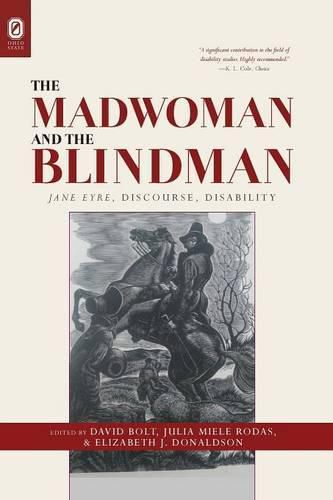Readings Newsletter
Become a Readings Member to make your shopping experience even easier.
Sign in or sign up for free!
You’re not far away from qualifying for FREE standard shipping within Australia
You’ve qualified for FREE standard shipping within Australia
The cart is loading…






This title is printed to order. This book may have been self-published. If so, we cannot guarantee the quality of the content. In the main most books will have gone through the editing process however some may not. We therefore suggest that you be aware of this before ordering this book. If in doubt check either the author or publisher’s details as we are unable to accept any returns unless they are faulty. Please contact us if you have any questions.
This breakthrough volume of critical essays on Jane Eyre from a disability perspective provides fresh insight into Charlotte Bronte’s classic novel from a vantage point that is of growing academic and cultural importance. Contributors include many of the preeminent disability scholars publishing today, including a foreword by Lennard J. Davis. Though an indisputable classic and a landmark text for critical voices from feminism to Marxism to postcolonialism, until now, Jane Eyre has never yet been fully explored from a disability perspective. Customarily, impairment in the novel has been read unproblematically as loss, an undesired deviance from a condition of regularity vital to stable closure of the marriage plot. In fact, the most visible aspects of disability in the novel have traditionally been understood in rather rudimentary symbolic terms–the blindness of Rochester and the madness of Bertha apparently standing in for other aspects of identity. The Madwoman and the Blindman: Jane Eyre, Discourse, Disability, resists this traditional reading of disability in the novel. Informed by a variety of perspectives–cultural studies, linguistics, and gender and film studies–the essays in this collection suggest surprising new interpretations, parsing the trope of the Blindman, investigating the embodiment of mental illness, and proposing an autistic identity for Jane Eyre. As the first volume of criticism dedicated to analyzing and theorizing the role of disability in a single literary text, The Madwoman and the Blindman is a model for how disability studies can open new conversation and critical thought within the literary canon.
$9.00 standard shipping within Australia
FREE standard shipping within Australia for orders over $100.00
Express & International shipping calculated at checkout
This title is printed to order. This book may have been self-published. If so, we cannot guarantee the quality of the content. In the main most books will have gone through the editing process however some may not. We therefore suggest that you be aware of this before ordering this book. If in doubt check either the author or publisher’s details as we are unable to accept any returns unless they are faulty. Please contact us if you have any questions.
This breakthrough volume of critical essays on Jane Eyre from a disability perspective provides fresh insight into Charlotte Bronte’s classic novel from a vantage point that is of growing academic and cultural importance. Contributors include many of the preeminent disability scholars publishing today, including a foreword by Lennard J. Davis. Though an indisputable classic and a landmark text for critical voices from feminism to Marxism to postcolonialism, until now, Jane Eyre has never yet been fully explored from a disability perspective. Customarily, impairment in the novel has been read unproblematically as loss, an undesired deviance from a condition of regularity vital to stable closure of the marriage plot. In fact, the most visible aspects of disability in the novel have traditionally been understood in rather rudimentary symbolic terms–the blindness of Rochester and the madness of Bertha apparently standing in for other aspects of identity. The Madwoman and the Blindman: Jane Eyre, Discourse, Disability, resists this traditional reading of disability in the novel. Informed by a variety of perspectives–cultural studies, linguistics, and gender and film studies–the essays in this collection suggest surprising new interpretations, parsing the trope of the Blindman, investigating the embodiment of mental illness, and proposing an autistic identity for Jane Eyre. As the first volume of criticism dedicated to analyzing and theorizing the role of disability in a single literary text, The Madwoman and the Blindman is a model for how disability studies can open new conversation and critical thought within the literary canon.